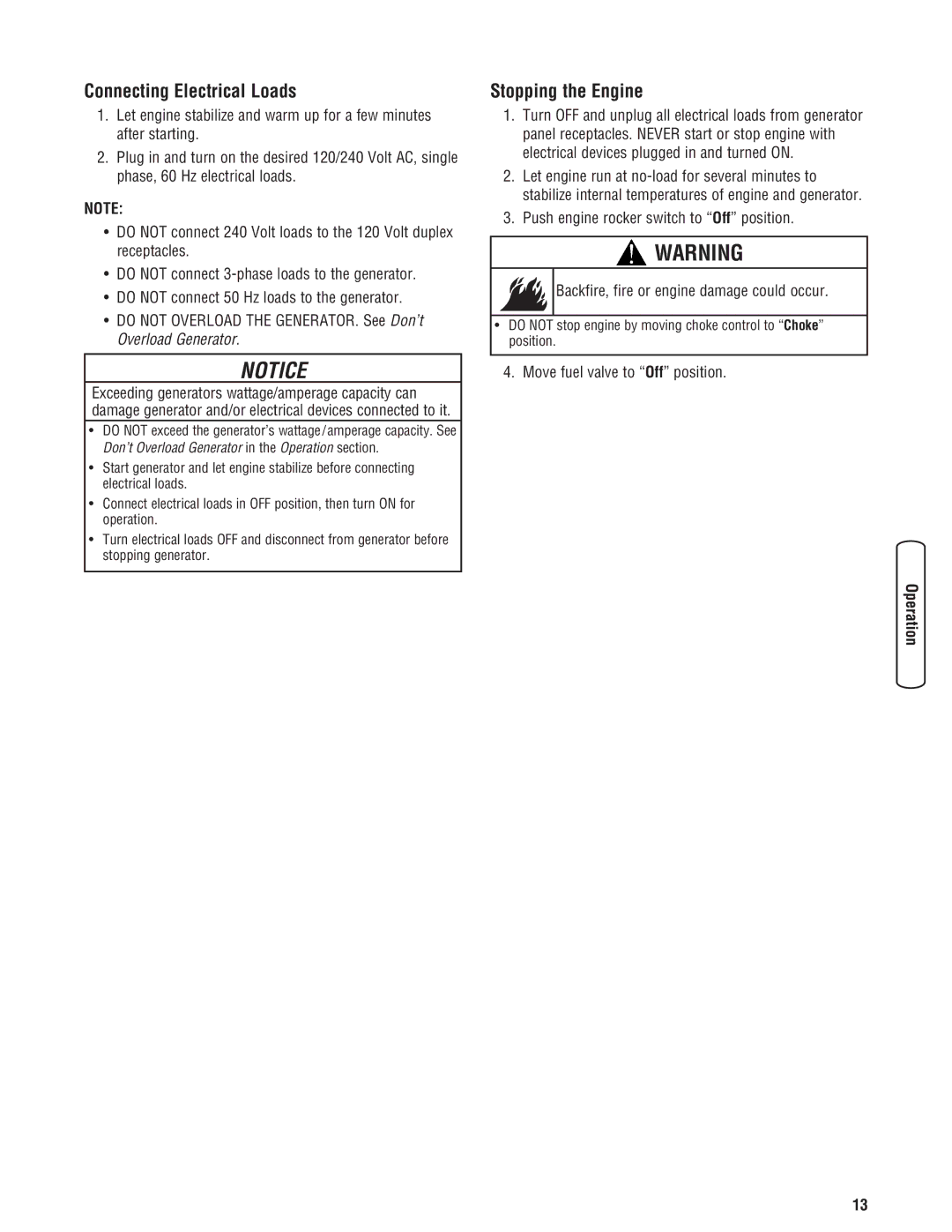Operator’s Manual
Generator
Where to Find Us
Engine
Date Purchased
Table of Contents
Safety Rules
Operator Safety
Safety alert symbol is used with a signal word
Hazard Symbols and Meanings
Certain components in this product and related
Engine exhaust from this product contains
Broken bones, fractures, bruises, or sprains could result
Contact with muffler area can result in serious burns
When Testing for Engine Spark
Unintentional sparking can result in fire or electric shock
Shipment Contents
Assembly
Install Wheel Kit
Unpack Generator
Add Fuel
Add Engine Oil
Fuel must meet these requirements
High Altitude
System Ground
Connecting to a Building’s Electrical System
Generator Location
Special Requirements
Used to supply electrical power for the operation
Features and Controls
Volt AC, 20 Amp, Duplex Receptacles May be
Items Not Shown
Nema L14-30
Cord Sets and Receptacles
120/240 Volt AC, 30 Amp, Locking Receptacle
Volt AC, 20 Amp, Duplex Receptacles
Starting the Engine
Operation
Stopping the Engine
Connecting Electrical Loads
Move fuel valve to Off position
Wattage Reference Guide
Don’t Overload Generator
Maintenance Schedule
Maintenance
Generator Maintenance
Oil
Engine Maintenance
Service Spark Plug
Service Air Cleaner
Install spark plug and tighten firmly
Service Spark Arrester
Air Cooling System
Carburetor Adjustment
Check Valve Clearance
Storage
Troubleshooting
Owner’s Warranty Responsibilities
Emissions Control System Warranty
Warranties
Emission Information
Maintenance
Claims and Coverage Exclusions
Limited Warranty
Common Service Parts
Product Specifications
AC Load Current
800
Manual del Operario
Generador
Dónde encontrarnos
Motor
Fecha de compra
Seguridad de operario
Resolución de problemas Garantías
Montaje
Controles y características
Descripción del equipo
Seguridad de operario
Reglas de seguridad
Símbolos de peligro y sus significados
Declaradas cancerígenas, causantes de
Determinados componentes en este producto y los
Cuando Pruebe LA Bujía DEL Motor
Cuando Ajuste O Haga Reparaciones a SU Máquina Generador
Desembalaje del generador
Montaje
Contenido de la caja
Instale el juego de ruedas
Vuelva a colocar el tapón y apriételo firmemente
Agregar aceite al motor
Evite el daño del generador
Gran altitud
Conexión al sistema eléctrico de un edificio
Tierra del sistema
Ubicación del generador
Requisitos especiales
Amperios, monofásica de 60 Hz
Controles y características
Culatazo el Principio Usó para comenzar motor
120/240 Voltios AC, 30 Amperios, Receptáculo de Seguridad
Juegos de cordones y enchufes conectores
Tomas eléctricas dobles de 120 V CA y 20 a
Amps o mayores
Encienda el motor
Operando
Parada del motor
Conexión de cargas eléctricas
El motor podría petardear, incendiarse o dañarse
Gire la válvula de combustible blanca hasta la posición Off
Capacidad
No sobrecargar el generador
Ejemplo
Control de la energía
Plan de mantenimiento
Mantenimiento
Mantenimiento del Generador
Aceite Recomendaciones sobre el aceite
Mantenimiento del Motor
Comprobación del Nivel de Aceite
Adición de Aceite del Motor
Limpia E
Servicio del depurador de aire
Servicio del bujía
Limpie la Pantalla Apagachispas
Comprobación de holgura de la válvula
Sistema de refrigeración de aire
Ajuste del Carburador
Almacenamiento
Problemo Causa Accion
Resolución de problemas
Garantía del sistema de control de emisiones
Garantías
Responsabilidades de la garantía del propietario
Operaciones de mantenimiento que se enumeran en las
Información sobre emisiones
Garantía Limitada
Servicio común despide
Especificaciones del producto
Corriente Carga de C.A

![]() WARNING
WARNING![]() Backfire, fire or engine damage could occur.
Backfire, fire or engine damage could occur.